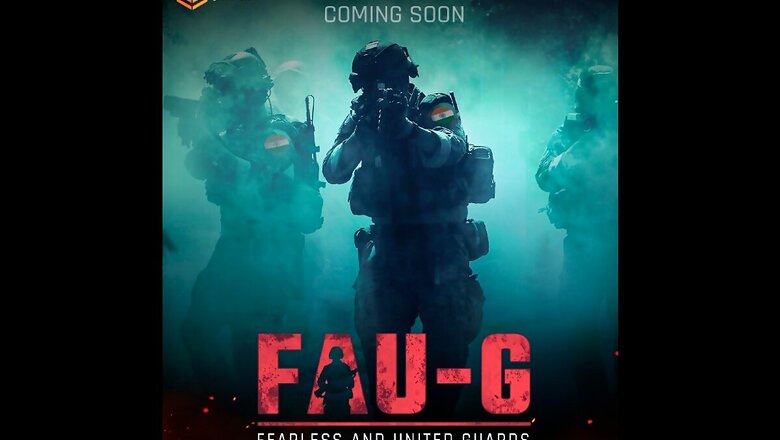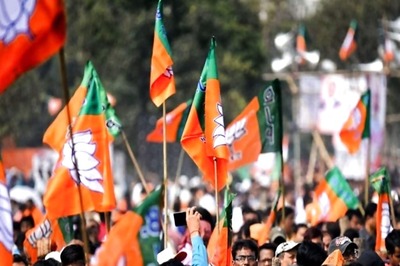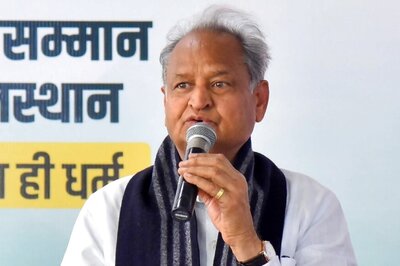
views
FAU-G, the upcoming Indian shooter game, made headlines as it premiered on the heels of massively popular battle royale game PUBG Mobile being banned in India. Earlier this week, the first (and rather brief) cinematic trailer was posted online by actor Akshay Kumar, followed closely with PUBG Corp announcing the end of support for PUBG Mobile gamers in India, starting today, October 30.
Despite these circumstances, its maker, nCore Games’ strategic advisor Vishal Gondal, insists that FAU-G will not remain a mere alternative to PUBG Mobile. Instead, Gondal says that it plans to be one of India’s very first mobile games that will introduce storylines inspired by real-life action. He highlights that the first level that FAU-G will launch with is going to be based on India’s Galwan Valley clash with China. He also insists that the gameplay will be different from PUBG Mobile, but at the same time, future updates will bring features such as signature guns and a Battle Royale mode.
More than anything else, Gondal insists that FAU-G will hopefully be the first-mover in India’s gaming ecosystem, bringing story-based gameplay, intricate levels, characters and so on.
Somewhere between PUBG and Call of Duty
Speaking to News18, Gondal says that the entire idea with FAU-G was to not blindly rival PUBG, but instead, offer a layered, level-based gameplay the way a more elaborate title (like Elder Scrolls: Blades) does. He says, “We have our own storyline, our gameplay mechanics are different. Our storyline follows activities of the Indian Army. For example, the first level of the game is based on Indian soldiers facing hand-to-hand combat at the Galwan Valley clash with China.”
However, Gondal affirms that the gamification of real-world military events will continue beyond just recent affairs, in a bid to draw inspiration from the activities of Indian soldiers. “Our future missions in FAU-G may include India’s conflicts at Uri, Kargil, other clashes with Pakistan and so on. Going forward, we will certainly be introducing a wider variety of weapons, and even a battle royale mode,” Gondal adds. He also states that the game will see the addition of new characters, weapons, game levels and so on, as part of rolling updates in future.
It is the latter part where nCore Games appears to be taking FAU-G as a more long-term affair. Previous attempts at gamification by Indian armed forces, such as the Indian Air Force game ‘IAF: A Cut Above’, was commended for being a fairly decent game to play. Despite the strong initial reaction, it was not a game that garnered enduring reputation. It is this hurdle that Gondal and his team behind FAU-G will have to surpass.
The lack of ‘real’ games in India
Gondal was an early mover in the field of esports, or online gaming championships, back in 2004. Since then, Gondal has attempted to promote gaming as a profession through his venture India Gaming, which he later sold to Disney back in 2012. This time, though, the market is different – internet, gadget and gaming penetration is far higher than they ever were. Gondal, however, notes a key problem with the way India’s gaming industry has progressed so far.
“Nobody has really invested in gaming, so far – everyone appears to have taken the shortcut and bet on fantasy sports, real money skill games and so on. These, however, aren’t gaming in the true, old school sense. Even if you look at the mobile app stores, there are no notable Indian games in the market except for Ludo King. In contrast, if you look at Netflix, Prime Video or YouTube, many of their chart-toppers are Indian. This makes it clear that local content should always perform better than international content. It is this investment gap that we aim to fulfil. The key target is Indian, high quality, gaming content,” Gondal says.
He also believes that the reason why there have been no Indian-built AAA game titles, and minimal Indian contribution to AAA game projects by major studios such as Ubisoft (which have studios in India), is because of how much investment there has been in fantasy and real money gaming. It is this notion that Gondal’s nCore Games aims to alter.
To do this, Gondal says that his company is now working on a large portfolio of games, all designed for mobile platforms. While he did not divulge the names of the upcoming games, he says, “We’re working on a musical game, and a cricket title is in the pipeline as well. We plan to make official announcements for these games within the next few months itself.”
Supporting esports through FAU-G
Gondal affirms that nCore Games does aim to be a supporter of competitive esports championships in the long run, once it starts launching its offerings in public domain. Calling FAU-G potential of building and supporting an ecosystem around it a “long term bet”, Gondal states that he expects any game to take between six months and two years to stabilise and build a market reputation. “Once we get deeper into esports with our game offerings, we will automatically enter the entire arena of managing a gaming community. That is our long term roadmap,” he says.
The only catch, Gondal says, lies in the quality of gaming that FAU-G manages to achieve. As he underlines, the expectations behind the quality of a mobile game, thanks to the likes of PUBG Mobile, Fortnite and Call of Duty: Mobile, have increased exponentially. With its mid-November launch, Gondal and his team at nCore will hope to have lived up to the expectations and hype surrounding FAU-G. Will it succeed? Only time will tell.
Read all the Latest News and Breaking News here




















Comments
0 comment